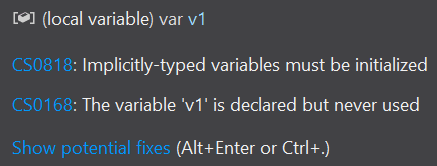Declaration
- var must be initialized at the time of declaration.
- It is not mandatory to initialize dynamic while declaration.
var v = "Hello World"; //(work)
var v1; //(throw error).
dynamic d; //(work)
dynamic d1 = "hello world"; //(work)

Static vs. Dynamic Typing
- var is a statically typed variable. The type of the variable is determined at compile-time. Once the type is determined, it cannot be changed.
- dynamic is a dynamically typed variable. The type of the variable is determined at runtime when the code is executed.
Compile-time vs. Runtime Type Checking
- var variables are subject to compile-time type checking. The compiler enforces type checking at compile-time based on the assignment.
- dynamic variables are subject to runtime checking. This means that any type-related errors may not be caught until runtime, which can lead to potential runtime errors if not handled carefully.
IntelliSense and Compile-time Error Checking
- var variables provide IntelliSense support in IDEs as the actual type of the variable is known at compile-time.
- dynamic variables do not provide IntelliSense support, as the type is not known until runtime.
Performance
- var has better performance as it is resolved at compile-time.
- dynamic has a performance cost due to the runtime type checking and late binding.
In summary, var and dynamic in C# are both used for runtime type determination, but 'var' is a statically typed variable with compile-time type checking and type inference, while 'dynamic' is a dynamically typed variable with runtime type checking. Care should be taken while using 'dynamic' due to its potential runtime errors and performance implications, and it should be used only when truly needed for dynamic scenarios where static typing is not suitable.





Top comments (0)